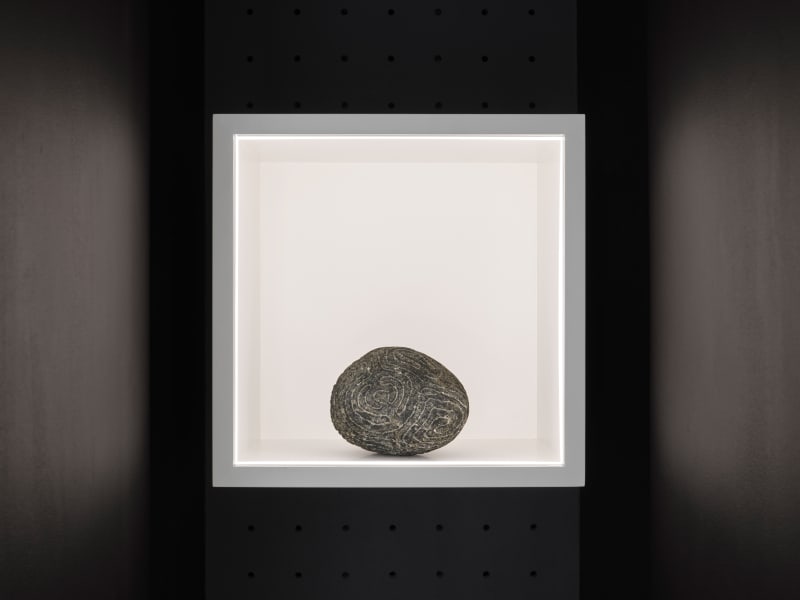'Geometry is the theme on which nature plays her infinite variations and can be seen as a kind of pattern book on which the most complex and sophisticated structures are based.'
Pippy Houldsworth Gallery is pleased to present A Little Bit of Infinity Serpentine VI, a recent sculpture by Peter Randall-Page, in the gallery’s micro project space, The Box.
From the granular to the epic, Randall-Page’s practice is informed by the study of natural structures. His sculptures evoke the seasonal cycle of the infinitesimal in nature, from pollen grains and plant cells to poppy pods and allium spheres, from pinecones to horse chestnuts. Conscious of the delicate spatial relationship between sculpture, setting and viewer, his works relate to the human scale, eliciting a subjective emotional response. Yet Randall-Page is primarily known for working on a grand scale; for The Core, the Education Resource Center within The Eden Project, Cornwall, the artist created a monumental granite sculpture Seed that can be found at the heart of the site. The ovular sculpture and its light-flooded chamber is an exemplar of the sublime quality of his larger work. Conversely, in A Little Bit of Infinity Serpentine VI presented within The Box, the intimately scaled sculpture takes on a new value of meditative introspection.
In A Little Bit of Infinity Serpentine VI, Randall-Page works with Cornish serpentine, a stone found at the foot of the Lizard Peninsula only 100 miles from his studio. In this work, the artist’s technique digresses from that of his larger scale public commissions. Its roughly hewn surface, markedly different to that of his highly polished granite and pebble works, responds to the materiality of its source. Just as the original serpentine is chipped and made jagged by crashing Atlantic waves, Randall-Page’s pitted and whittled sculpture considers its original form, echoing natural processes of weathering and abrasion. His characteristic geometry, incised in fine serpentine lines, takes on both a coral-like appearance, as well as the mystical timbre of an ancient rune or prehistoric artefact.
Peter Randall-Page (b. 1954, Essex UK) lives and works in Exeter. He studied at Bath Academy of Art and has been awarded an honorary Doctorate of Arts from the University of Plymouth and honorary Doctorates of Letters from York St John University, Exeter University and Bath Spa University. In 2015 he was elected as a Royal Academician of sculpture, and in 2017 he was awarded the RIBA London Award and the RIBA National Award for his façades of The Laboratory at Dulwich College. Randall-Page has exhibited internationally, with major retrospectives held at Leeds City Art Gallery and Yorkshire Sculpture Park. His work is included in numerous public collections, including The Victoria and Albert Museum, London; Tate, London; The Royal Academy, London; Dulwich Picture Gallery, London; The British Council, London; The British Museum, London; Ulster Museum, Belfast; Museum Würth, Germany; The National Trust Foundation for Art, UK; Falmouth Art Gallery, Cornwall; and Pallant House Gallery, Chichester.
